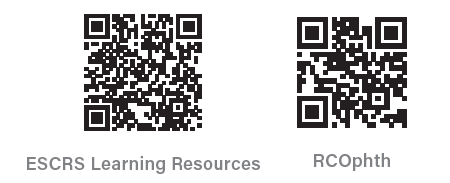Cataract, Refractive
The Digital Ophthalmologist
Online medical education: pros, cons, and future looks.

Roibeard O’hEineachain
Published: Thursday, June 1, 2023
Dr George Liu Reports
In December 2019, whispers of coronavirus disease 2019 (COVID-19) began to spread. Initially, like most services around the world, medical education suffered, and subsequently, so did students. When the inevitable happened, we adapted. Our modern world of social media and the rise of online services allowed medical educators to communicate and rethink how they could educate.
Webinars
The rise of webinars, Zoom calls, and virtual conferences ensued. Alongside university-prescribed webinars, an abundance could be found online. Every day one would be spoilt for choice for supplementary materials. However, this real-time evolution did not come without its cons. Initially, there was no way of distinguishing self-proclaimed medical educators from accredited ones. There was often repetition between webinars. And after some time, prescribed educators became preoccupied with their clinical workload, and live webinars morphed into pre-recorded sessions. The combination of these factors contributed to “webinar fatigue.”
In an interview, Professor Pearse Keane, Consultant Ophthalmologist at Moorfields Eye Hospital, London, told EuroTimes he finds webinars awkward, removing much of the spontaneity live teaching can provide. Prof Keane encourages camera use and prefers “icebreaker” introductions when running artificial intelligence journal clubs with his colleagues.
From an academic viewpoint, the proliferation of free webinars also posed difficulties for traditional seminars, which normally incurred a fee. Professor Christopher Liu OBE, Honorary Treasurer of The Royal College of Ophthalmologists (RCOphth), stressed the importance of these fees as a source of income for bodies such as RCOphth for carrying out statutory duties for the profession.
Mr Ahmed Shalaby Bardan, Consultant Ophthalmologist at Leeds Teaching Hospitals, describes his preferred method of online interactive live courses as more engaging, enabling active discussion. He also supports recording lectures so students can keep the material and review it when they want to refresh their training. Mr Bardan also recommends sharing content with trainees at the right stage of their career, as pitching information at the right level is key to engaging an audience.
Social media
Social media adjuncts to medical education also contributed to the education evolution. YouTube surgical videos have become a mainstay for all trainees. Whilst a variety of Instagram and Facebook medical pages, such as “Zero to Finals”, offered excellent resources such as spot questions followed by disease summaries, students shouldered a never-ending supply of medical education resources infiltrating their personal social media feed. This disruption to work-life balance lasted 24/7 and perhaps contributed to the increased stress levels throughout the UK during COVID-19.
Prof Keane, an avid user, describes Twitter as by far the best platform for identifying new ideas and hot topics. Similarly, Mr Bardan uses social media for live broadcasting and sharing knowledge and experience. He says social media has the advantage of showing different techniques and hosting open discussions with audiences whilst concurrently responding to questions and getting feedback. Mr Bardan believes social media—if used properly for teaching—can be a very strong aid to the teacher and an asset for the student.
Accredited online medical education platforms
In-person ophthalmology conferences offer a plethora of educational gems for students and consultants alike. However, prior to COVID-19, expenses, travel time, annual leave, and sustainability were some factors limiting accessibility. Now, with virtual access to many conferences, this barrier has mostly been overcome. Yet still, there is scope for development as delegates miss out on the physical aspects, such as wet labs and networking.
The Royal College offers its members INSPIRE—an online, comprehensive learning platform that covers the full spectrum of ophthalmology integrated into a unified learning provision. INSPIRE gives its users access to learning anytime and anywhere, harnessing various modalities best suited to both the type of learning and the learner.

In addition to its two annual in-person conferences, the ESCRS offers its members a host of online learning opportunities: ESCRS iLearn, ESCRS research portals, landmark articles, EuroTimes podcasts, ESCRS on demand, EuroTimes conference coverage in ESCRS Today, JCRS online case reports, the Video Journal of Cataract, Refractive, and Glaucoma Surgery, and access to the FEBOS-CR exam.

Yet online education platforms have limitations. Whilst one can learn theory for any operation, real-life experience is paramount, preferably initially supervised by an experienced trainer, says Prof Liu. Therefore, proficient surgical theory does not denote surgical competence.
The future of medical education
Cue the metaverse. Whilst this may still be a sandbox project, the metaverse shows great potential for interactive learning that could mimic current teaching norms through immersive technology. In theory, virtual, augmented, or mixed reality are excellent tools to simulate theory, surgery, and critical thinking in a patient-safe environment. But one cannot ignore the looming cost of virtual reality hardware and software and the wavering reliability of one’s internet connection. Despite these challenges, there is certainly room for development, either as a discrete unit or potentially paired with artificial intelligence to generate a self-adapting education tool for all.
George Liu BSc Hons is a 4th year Medical Student, Chelmsford, Essex, Tongdean Eye Clinic, UK. GeorgeLiu.Surg@gmail.com

Latest Articles
Making Female Leadership More than a Moment
A remarkable global confluence of women in key positions.
ESCRS Talks Technology at AAO
Europe adopts technological advances, US still waiting for lenses and lasers.
Sorting Out Simultaneous Vision IOLs
The ESCRS Eye Journal Club discuss a new landmark paper on IOL classification and the need for harmonisation of terminology for presbyopic IOLs.
Big Advantages to Small-Aperture IOLs
Small-aperture IOLs offer superior image quality with increased range of focus.
Prioritising Self-Care
Benefits of maintaining physical, emotional, and mental health extend beyond the personal sphere.
Valuing Clinical Trial Design
How inclusivity and diversity can enhance scientific accuracy in research.
Knowing Iris Repair: Using Iridodiathermy in Iris Surgery
Prepare for decentred pupils and uneven irides in multiple situations.
Neuroprotectant Treatment for MacTel Type 2
Intravitreal implant releasing ciliary neurotrophic factor found safe and effective in pivotal trials.